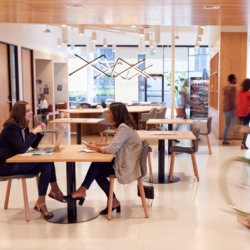November 19, 2020
Search Results for: remote work
November 19, 2020
Six key factors of productivity for organisations disrupted by lockdown
by Jayne Smith • Flexible working, News, Working culture
 With a new national lockdown, the situation in the UK remains unpredictable and complicated, and renewed pressure to work from home has forced many organisations to reverse their back-to-work plans, according to a new study from Advanced Workplace Associates (AWA). The study has detailed the matrix of pain that employees may be suffering due to this challenging situation – from those who didn’t want to return to the office when restrictions were eased but had to, to those who are unhappy about working from home. In creating unhappy, disengaged employees, these pain points undermine the six key factors of productivity, defined by the AWA as: social cohesion, trust, perceived supervisory support, information sharing, vision and goal clarity, and external communication. (more…)
With a new national lockdown, the situation in the UK remains unpredictable and complicated, and renewed pressure to work from home has forced many organisations to reverse their back-to-work plans, according to a new study from Advanced Workplace Associates (AWA). The study has detailed the matrix of pain that employees may be suffering due to this challenging situation – from those who didn’t want to return to the office when restrictions were eased but had to, to those who are unhappy about working from home. In creating unhappy, disengaged employees, these pain points undermine the six key factors of productivity, defined by the AWA as: social cohesion, trust, perceived supervisory support, information sharing, vision and goal clarity, and external communication. (more…)
November 18, 2020
Generation BETA is the latest demographic grouping you need to acknowledge, claims report
by Jayne Smith • News, Technology, Working culture
 GlobalWebIndex (GWI), together with LinkedIn’s B2B Institute, has launched “Work in BETA: The Rising B2B Decision Maker”. The new report sets out to examine the ‘changing behaviours and attitudes of “the BETAs” – the first cohort of digital natives (21 to 40 year-olds) to assume positions of seniority in business, at a time of dislocation’. (more…)
GlobalWebIndex (GWI), together with LinkedIn’s B2B Institute, has launched “Work in BETA: The Rising B2B Decision Maker”. The new report sets out to examine the ‘changing behaviours and attitudes of “the BETAs” – the first cohort of digital natives (21 to 40 year-olds) to assume positions of seniority in business, at a time of dislocation’. (more…)
November 17, 2020
Top priority for HR leaders in 2021: building critical skills
by Jayne Smith • Business, News, Working culture
 Gartner, Inc.’s 2021 HR Priorities Survey of more than 750 HR leaders claims that 68 percent of respondents cited building critical skills and competencies as their number one priority in 2021. The survey, conducted from June through August 2020, claims the other top HR priorities for 2021 are: organisational design and change management (46 percent), current and future leadership bench (44 percent), the future of work (32 percent) and employee experience (28 percent). (more…)
Gartner, Inc.’s 2021 HR Priorities Survey of more than 750 HR leaders claims that 68 percent of respondents cited building critical skills and competencies as their number one priority in 2021. The survey, conducted from June through August 2020, claims the other top HR priorities for 2021 are: organisational design and change management (46 percent), current and future leadership bench (44 percent), the future of work (32 percent) and employee experience (28 percent). (more…)
November 13, 2020
Mental health continues to deteriorate as a result of the pandemic
by Neil Franklin • Flexible working, News, Wellbeing
 Morneau Shepell has published its monthly Mental Health Index report, which claims there is a a consistent trend of negative mental health among Britons at the seven-month mark of the pandemic. The Mental Health Index for October is -13.4, suggesting that Britons’ mental wellbeing continues to be at risk, with declining workplace productivity and the need for support adding to the continuing strain of the pandemic. (more…)
Morneau Shepell has published its monthly Mental Health Index report, which claims there is a a consistent trend of negative mental health among Britons at the seven-month mark of the pandemic. The Mental Health Index for October is -13.4, suggesting that Britons’ mental wellbeing continues to be at risk, with declining workplace productivity and the need for support adding to the continuing strain of the pandemic. (more…)
November 10, 2020
November lockdown reignites concerns about mental health and productivity
by Jayne Smith • News, Wellbeing, Working lives
 A vast majority of managers (75 percent) faced challenges with employees when working remotely, causing concerns within businesses preparing for the second UK lockdown. (more…)
A vast majority of managers (75 percent) faced challenges with employees when working remotely, causing concerns within businesses preparing for the second UK lockdown. (more…)
October 23, 2020
KI helps transform RFIB headquarters in The Gherkin
by Freddie Steele • Company news, Workplace design
 Insurers RFIB have transformed their workplace strategy to embrace both traditional and new ways of working at ’s the firm’s new global headquarters at 30 St Mary Axe in London. Located on the twelfth floor of this landmark building, the new offices feature panoramic views and generous natural light. Offering an enhanced user and visitor experience, they are bright, open, flexible and high quality. (more…)
Insurers RFIB have transformed their workplace strategy to embrace both traditional and new ways of working at ’s the firm’s new global headquarters at 30 St Mary Axe in London. Located on the twelfth floor of this landmark building, the new offices feature panoramic views and generous natural light. Offering an enhanced user and visitor experience, they are bright, open, flexible and high quality. (more…)
October 19, 2020
Change fatigue among employees has doubled this year
by Jayne Smith • News, Wellbeing, Working lives
 The amount of change that the average employee can absorb without suffering fatigue in 2020 has been cut in half compared to 2019, according to Gartner, Inc. Amid worries about the economy, job security, their health and the health of their loved ones, employees’ capacity to take on change in the workplace has plunged significantly. (more…)
The amount of change that the average employee can absorb without suffering fatigue in 2020 has been cut in half compared to 2019, according to Gartner, Inc. Amid worries about the economy, job security, their health and the health of their loved ones, employees’ capacity to take on change in the workplace has plunged significantly. (more…)
October 19, 2020
Frontline leaders blocked from strategic decision making
by Jayne Smith • Business, News, Working lives
 New research commissioned by Workplace from Facebook claims frontline managers are being shut out from making strategic decisions, due to a prevailing disconnect with leaders in HQ. Despite the Covid-19 pandemic highlighting the importance of the frontline and its leaders, managers in this environment have not been empowered to make decisions. (more…)
New research commissioned by Workplace from Facebook claims frontline managers are being shut out from making strategic decisions, due to a prevailing disconnect with leaders in HQ. Despite the Covid-19 pandemic highlighting the importance of the frontline and its leaders, managers in this environment have not been empowered to make decisions. (more…)
October 16, 2020
HR Directors worry about delivering a consistent employee experience
by Jayne Smith • News, Wellbeing, Working lives
 New research by Applaud, claims that 45 percent of HR Directors (HRDs) think the biggest challenge of delivering a good employee experience in the next six months will be making sure that all employees are receiving a consistent experience, regardless of whether they’re remote or office based. (more…)
New research by Applaud, claims that 45 percent of HR Directors (HRDs) think the biggest challenge of delivering a good employee experience in the next six months will be making sure that all employees are receiving a consistent experience, regardless of whether they’re remote or office based. (more…)
October 15, 2020
Employees want to see a redesign for better hybrid meetings
by Jayne Smith • News, Technology, Working lives
 A new global study by Barco ClickShare claims that employees worldwide are desperate to get back to the office and are looking for their employers to invest in a technology-driven hybrid working environment post-COVID-19. The study, which surveyed 1,750 employees around the world through global research panel provider Dynata – claims that only 15 percent of employees want to continue to work from home full-time after COVID-19 restrictions are lifted. (more…)
A new global study by Barco ClickShare claims that employees worldwide are desperate to get back to the office and are looking for their employers to invest in a technology-driven hybrid working environment post-COVID-19. The study, which surveyed 1,750 employees around the world through global research panel provider Dynata – claims that only 15 percent of employees want to continue to work from home full-time after COVID-19 restrictions are lifted. (more…)






 A new report from the
A new report from the 










 With current government advice encouraging all those who can work from home to do so, it’s no surprise that Britain’s businesses and employees are navigating a new normal. New research from
With current government advice encouraging all those who can work from home to do so, it’s no surprise that Britain’s businesses and employees are navigating a new normal. New research from 






